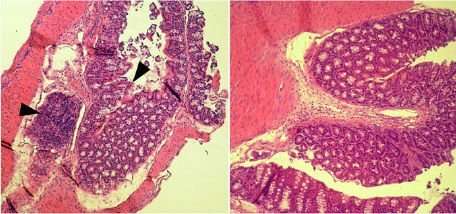Defense against intestinal infection in organism is affected by prostaglandin E2

The treatment of intestinal infections caused by some strains of the bacterium Escherichia coli, present in unsanitized or contaminated foods, may have a new ally.
A study published in PNAS reports that the inhibition of prostaglandin E2 (PGE2), a lipid mediator released during the process of infected cell clearance (efferocytosis) in the intestine, enhanced the ability of mice to combat infectious colitis.
"Tissue cell death is intense during a bacterial infection. Many immune cells recruited to the site of the infection also die. We found that during the removal of dead and infected cells, a process called efferocytosis, there was an increase in the release of proteins and of the lipid mediator prostaglandin E2. However, the presence of PGE2 impaired the differentiation of Th17 [or T helper 17] cells, lymphocytes that play a key role in the resolution of intestinal infections," said Alexandra Ivo de Medeiros, a professor at São Paulo State University's School of Pharmaceutical Sciences (FCF-UNESP) in Araraquara, Brazil, and principal investigator for the study.
To prove this hypothesis, the researchers inhibited the production of PGE2 using nonsteroidal anti-inflammatory drugs such as indomethacin and ibuprofen. The inhibition of PGE2 resulted in increased differentiation of Th17 cells.
"Th17 cells play a key role in resolving bacterial intestinal infection by promoting the recruitment of inflammatory cells and the production of natural antibiotics," Medeiros told.
The study funded by São Paulo Research Foundation -FAPESP also showed that blocking only one PGE2 receptor, EP4, reversed the suppressive effect of PGE2 on the differentiation of Th17 cells.
Different functions
"Prostaglandin E2 can perform different functions depending on the type of cell and receptor involved. Our use of the EP4 prostaglandin receptor antagonist enhanced the resolution of infectious colitis," said Naiara Naiana Dejani, first author of the article. Dejani earned her Ph.D. with a scholarship from FAPESP.
Another finding of the study was that inhibiting prostaglandin synthesis or signaling by treatment with the EP4 antagonist L-161,982 favored the expression of defensins, which are considered natural antibiotics, in the colon.
"The use of a specific antagonist of the PGE2 receptor, such as the EP4 receptor antagonist, offers advantages in terms of an auxiliary proposal for the treatment of infectious colitis. Nonselective nonsteroidal anti-inflammatory drugs, or NSAIDs, such as indomethacin and ibuprofen, are inexpensive but can cause adverse events that have been well described in the literature," Dejani said.
Despite the protective effect of Th17 cells in bacterial infection, these same cells may cause chronic inflammation and autoimmune disease, so while the discovery points to an important potential ally of antibiotics in treating infections, a buildup of Th17 cells in the intestine could result in future complications.
Infection
In the experiment, mice were orally infected with a bacterium (Citrobacter rodentium) that mimics infection by E. coli in humans. After 24 hours, they began receiving a one-week treatment. Indomethacin was administered every two days to one group, while a second group received a daily dose of L-161,982 (the EP4 antagonist). Controls were given an innocuous substance.
Analysis of the intestine in all groups at the end of the treatment showed that the use of an EP4 antagonist may be a promising strategy for the auxiliary treatment of infectious colitis. However, further research is required to show whether combining the EP4 antagonist and antibiotic therapy improves the resolution of this bacterial infection.
More information: Naiara Naiana Dejani et al, Intestinal host defense outcome is dictated by PGE2 production during efferocytosis of infected cells, Proceedings of the National Academy of Sciences (2018). DOI: 10.1073/pnas.1722016115
















